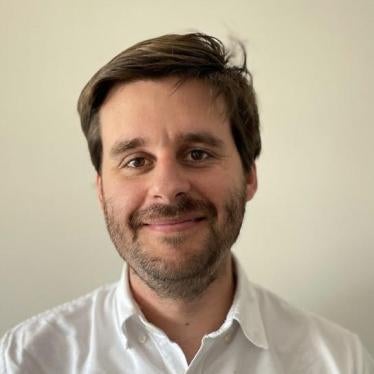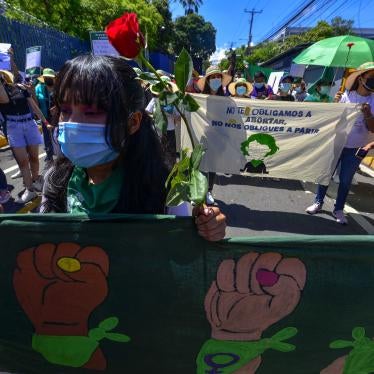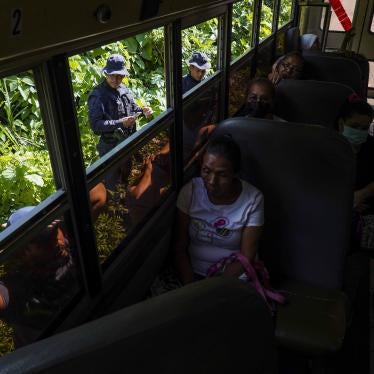El Salvador’s President Nayib Bukele is highly undemocratic, highly abusive—and highly popular.
With worrying levels of crime and insecurity in Latin America, his security model threatens democratic institutions in the region. Responding to these challenges requires effective and rights-respecting measures to confront violence and crime.
Recently, Bukele’s allies in the Legislative Assembly passed a law that allows mass trials. Justice Minister Gustavo Villatoro said that up to 900 people could be prosecuted at the same time. Under new legislation, prosecutors will not be required to present individual evidence against alleged gang members, lawmakers said. These Kafkaesque trials would undermine access to justice for victims of gang violence, hinder the release of innocent people, and violate due process guarantees.
Security forces have arrested over 71,000 people, including more than 1,600 children, under a state of emergency that has suspended basic rights for almost a year and a half. Many Salvadorans with no connections to gangs have been arrested, especially in low-income neighborhoods. Our research shows that some people detained have been tortured, dozens have died in custody, and thousands have been subjected to inhumane conditions in detention, including extreme overcrowding. Most are held incommunicado.
An immense concentration of power in the executive branch made that possible. Since taking office, Bukele has packed the Supreme Court, replaced the attorney general with an ally of his, and purged the judiciary. He has promoted a hostile environment for journalists, forcing some into exile.
In many people’s eyes, however, Bukele’s security policies appear to be a solution to growing crime and violence in Latin America and the Caribbean. The country's long-standing high homicide rate decreased to 7.8 homicides per 100,000 people in 2022, according to official figures. Bukele says it has decreased even further in 2023, although changes in the ways killings are counted make it harder to estimate the true extent of the reduction. Extortion, which was the main source of gang financing, seems to have also significantly decreased.
In some countries, citizens are even calling for a Bukele of their own, however draconian his policies. Latinobarómetro, a regional public opinion survey, recently said that Bukele was the “best ranked president of all times since the start of [democratic] transitions in Latin America.”
It’s easy to see why.
According to the latest statistics, the region had the highest regional homicide rate in the world, with 19.91 homicides per 100,000 people in 2021—nearly double the rate the World Health Organization considers the threshold for “endemic violence.”
While some countries like Venezuela and Honduras have reported rates of over 30 or even 40 homicides per 100,000 people, a number of large countries in the region, including Brazil, Mexico and Colombia, have rates between 20 and 30, and some countries with historically lower rates, such as Chile and Costa Rica, have had a significant increase in homicides in recent years. Rates of other crimes, such as extortion, are also high.
Most worrying, gangs in Ecuador have fueled a dramatic increase in violence, with homicide rates doubling in a year, extortion at a historic high, and attacks with explosives, prison massacres, and killings of elected officials, prosecutors, judges, and political candidates.
Leaders in the region have struggled to come up with a rights-respecting and effective response. Colombian President Gustavo Petro’s “total peace” strategy has so far failed to reduce massacres, child recruitment, and kidnappings.
President Andres Manuel Lopez Obrador in Mexico has publicized a “hugs, no bullets” slogan, while increasing militarization, reducing funds for local police, and failing to reduce cartel violence. President Xiomara Castro of Honduras campaigned against militarization but recently re-established military control over prisons and, like Bukele, suspended constitutional rights in large parts of the country.
Bukele offers a simple way forward: mass imprisonment, more prisons, mass trials. Supported by a powerful propaganda machine, he has advertised his government’s human rights violations as achievements.
But his flashy propaganda also obscures some disturbing truths. According to the US Department of Justice, his government initially engaged in secret negotiations with gang leaders, offering jail privileges to imprisoned gang members and protection from extradition to the US, in exchange for the gangs’ commitment to lower homicide rates and to give him political support. As the negotiations fell through, the government shifted to iron fist security measures.
In the past, both secret negotiations with gangs and hardline security policies have failed to sustainably address gang violence. Bukele’s predecessors negotiated with gangs without effectively dismantling them. They achieved a short-term reduction in killings, followed by long-term surges in gang violence. At the same time, previous massive arrest strategies allowed gang members to increase recruitment in prisons, using detention centers as their base.
Bukele’s narrative is also deceptive. He has depicted democratic checks and balances as an obstacle for security. Rather, these are key to prevent corruption, and abuse of power, and ensure that the law is applied to all.
He has also portrayed human rights and public safety in opposition to each other. Much to the contrary, governments have a human rights obligation to take effective measures to protect the population from criminals and organized crime. In doing so, they are also obliged to respect due process guarantees—a critical protection to ensure that prosecutions are not arbitrary, innocent people are not abused, and that victims receive the justice they deserve.
Bukele’s popularity shows that Latin American governments are falling short. They should redouble their efforts to provide rights-respecting strategies to tackle the root causes of much criminality, including high levels of poverty and social exclusion, and push for strategic criminal prosecutions focused on violent abuses, particularly those committed by senior gang members or chronic abusers, and severing their networks of finance, political support, and weapons supply.
The lack of an effective and legitimate response to insecurity and crime is putting the lives of our citizens—and our democratic institutions—at risk.









